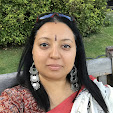From
The IndependentWhen Robert Fisk heard that his life of Saddam Hussein was selling well, one thing bothered him: he had never written one. His investigation took him to the murkiest corners of Cairo.Friday, 1 February 2008
It arrived for me in Beirut under plain cover, a brown envelope containing a small, glossy paperback in Arabic, accompanied by a note from an Egyptian friend. "Robert!" it began. "Did you really write this?"
The front cover bore a photograph of Saddam Hussein in the dock in Baghdad, the left side of his head in colour, the right side bleached out, wearing a black sports jacket but with no tie, holding a Koran in his right hand. "Saddam Hussein," the cover said in huge letters. "From Birth to Martyrdom." And then there was the author's name – in beautiful, calligraphic typeface and in gold in the top, right-hand corner. "By Robert Fisk."

Robert Fisk, right, with 'Mahmoud', who said that he had sold 100 copies of the forged biography in his Cairo bookshop
So there it was, 272 paperback pages on the life and times of the Hitler of Baghdad and selling very well in the Egyptian capital. "We all suspect a well-known man here," she added. "His name is Magdi Chukri."
Needless to say, I noticed one or two problems with this book. It took a very lenient view of the brutality of Saddam, it didn't seem to care much about the gassed civilians of Halabja – and it was full of the kind of purple passages which I loathe. "After the American rejection of the Iraqi weapons report to the UN," 'Robert Fisk' wrote, "the beating of war drums turned into a cacophony..."
Dare I suggest to readers that this kind of cliche doesn't sound like Robert Fisk? The only war drums I could hear were those of my own astonishment. For I never wrote this book. It wasn't plagiarism – a common practice in Cairo, which is why I ensure that all my real books are legally published in Arabic in Lebanon. No, this wasn't plagiarism. This was forgery.
And it was clearly the moment for Detective Inspector Fisk to hunt down "The Mystery of the Cairo Forger". Elementary, my dear reader, which is why I boarded Middle East Airlines flight ME304 from Beirut to my least favourite Arab capital, the bureaucratic, traffic-snarled, bankrupt, wonderful, lawless, irredeemable, spectacular Cairo.
I had called an Egyptian journalist friend, Saef Nasrawi, to be my Dr Watson and – a few metres from the front door of the Marriott Gezira Hotel – we found our faithful driver, Yasser Hassan. "Make sure you put my family name in your newspaper," he announced. I have now done so.
It's always been my theory that a taxi driver – especially in Cairo – will be more helpful, more friendly and altogether more enthusiastic if he knows why you're in the back of his cab. So, when I showed him the slim paperback, he raced off at once to what we all hoped was the office of the publisher, clearly printed on page two. "Ibda" the company was supposedly called and the Egyptian telephone operator had traced the name to an address in Old Cairo, No 953 Corniche el-Nil.
Through the downtown morning traffic, we ground, canyons of black and white taxis like our own; vast, single-storey buses packed with Galabiya-clad and bearded men; 4x4s carrying Cairo's demimonde of jewelled ladies and young men with shaving problems – the bewhiskered chin-for machismo is as much a problem in the Middle East as it is in London.
No 953 was a tall tenement block into which Saef and I could not penetrate without the permission of a black-cowled lady whose child was playing in the dust of the roadway. She listened as we called upstairs. Yes, a woman's voice said. We could take the elevator. On the wall beside the lift was a sign: "Ibda – the house of creativity for journalism, publication and distribution". I could believe in the "creativity" bit.
But the veiled and polite lady on the 11th floor was all ignorance. "We never published such a book," she said, and called her female boss, who was at the Cairo Book Fair. She called us back on our mobile and insisted – quite truthfully – that Saddam Hussein was not her work. Not only did she deny all knowledge of the forgery – her assistant weighed us down with her own genuinely produced books of literary endeavour.
Saef and Yasser debated our problem. The publishing details in the front of the book were clearly wrong. But the frontispiece announced that the book had been registered for circulation with the Egyptian government – in other words, it has been cleared for sale by the official censor. So, Detective Inspector Fisk decided that a visit to the Dar al-Kutb – the official "House of Books" attached to the Ministry of Culture – was our next destination. Had the forger, the so-called Magdi Chukri, been smooth enough to legalise his illegally produced book with the oh-so-law-abiding Egyptian government of President Hosni Mubarak?
"This is not good enough!" our driver, Yasser, roared at me. "Mr Robert, the people of Egypt will think you wrote this book. You must go to the British embassy, you must go to the Egyptian government, you must go to the police, you must go to our intelligence services." I had been through this kind of trust curtain before. Despite all evidence to the contrary, Egyptians still evince a blind confidence in Ottoman authority.
The Brits wouldn't care a damn about this forgery and the Egyptians even less – always supposing "Magdi Chukri" hadn't slipped the civil servants a few piastas for registering a book by "Robert Fisk".
We arrived at the Ministry of Culture, a bleak Stalinist office block next door to which we found "House of Books". On the first floor was an emporium – I hesitate to call it an office – of books, a vast atrium of volumes and manuscripts. They lay feet high on desks, metre high on shelves and – so it seemed – miles high from the floor. Hundreds, nay thousands, of books were stacked in Dickensian rows, floor to ceiling, bodice-rippers and Arabic fiction and treatises on Islamic jurisprudence and physics textbooks. Two veiled ladies and two bearded men sat at a desk amid this forest of literature, one of them – there is always a miracle in Cairo – in front of a grimy, faded-yellow desktop computer.
I asked if my favourite volume had been approved by the Egyptian government for sale. "By Robert Fisk?" the man asked.
"The very one!" I shouted.
"Yes, it was registered with us on 30 May 2007."
"Is there a name for the man who wanted to register it?"
"No, only an address. 13 Hassan Ramadan Street in Dokki."
Within seconds, Detective Inspector Fisk was bounding down the stairs, his faithful Dr Saef Watson on his heels. "To Dokki!" we demanded of the delighted Yasser. Now, surely, we were hot on the trail of the Forger of Cairo. A chance at last to confront Mr Magdi.
The problem – which all three of us realised – is that Magdi Chukri is about as common in Cairo as John Smith is in Britain.
There must be hundreds of thousands of Magdi Chukris in Egypt – one of whom is a former Egyptian foreign minister, a man of great probity who would never forge a book –which is probably why the writer chose the name.
We turned left into an evil-smelling alleyway – Hassan Ramadan Street – and stopped outside No 13. It was an underground mosque. Not only was it underground but, when Saef and I tried to enter the building, the wailed prayers of a funeral ascended from the basement.
A helpful bo'ab – all Egyptian buildings possess a doorman – arrived to insist that no publisher lived in the leaning, mud-brick tenement behind the mosque. "I know all these people," he said, pointing to each heavily-hung washing line. "These are the Wassiss, there are the Salmans ..."
At which point an elderly lady in spectacles, dressed in a smart black and white business suit, emerged from a stairway. No, she told Saef, there were no publishers here. "But there used to be that nice Mr Magdi Chukri."
"Magdi Chukri?!"
"Yes, but he moved out a year ago [before he registered his false address with the government, the Detective Inspector's computer brain worked out] and now he works at the branch of Mgboulli's bookshop around the corner."
Neither Holmes nor Watson ever moved so fast. Saef, Yasser and I hooted and screamed the wrong way out of Hassan Ramadan Street, donkey riders tight-eyed with hatred as we tooted them off the road. Only one thing mattered now. Number 45 Al-Batal Ahmed Abdul-Aziz Street, the local Mgboulli bookshop.
And there it was, its window packed with paperbacks, the "G" and "U" of Mgboulli having long ago fallen to the pavement.
There was a slim, cigarette-smoking Egyptian in a yellow smoking jacket with black velvet lapels blocking the doorway. "I want to buy a book," I said softly, the winning smile – I'm afraid – of an undercover policeman suffusing my face. There were two tough, beefy men inside, shop assistants as you've never seen them before. I asked for a well-known volume on the life of Saddam Hussein.
"By Robert Fisk?" I was asked.
"Why yes, the very one!"
I followed one of the beefy men upstairs to the "Saddam Hussein biography" section. At which point, he darted back downstairs and retrieved the book from a secret pile behind the counter. "Thirty Egyptian pounds," he said. I paid. Yes, I paid the equivalent of £2.86 for a book with my name on it which I never wrote.
The man in the yellow jacket - he now introduced himself as "Mahmoud" – asked me why I wanted to buy this particular tome. "Because this is my name on the cover," I said. "And here is my business card. I never wrote this book."
"Mahmoud" and the two beefy men burst into laughter. So did Saef. So did I. For this was a ticklish moment. Did "Mahmoud" know "Magdi Chukri", I asked?
"Yes, he is a good friend of mine. But he left us some time ago and now he lives in 6th October City. Here is his number." I called it. Switched off. There was another number. A woman answered, refused to give her name or address and hung up. "Mahmoud" shrugged.
"How many copies of this book have you sold," I asked.
"Mahmoud" drew on his cigarette. "At least 100 so far."
"So you owe me 3,000 Egyptian pounds!" I was enjoying this.
"But, no, Mr Robert, we don't owe you this," "Mahmoud" said with a cringing smile. "Because you have just told me you didn't write this book. How can we pay you for a book you did not write?"
Why did I like "Mahmoud"? Why did I love this moment?
Was it possible to find Mr Chukri in 6th October City? Could we perhaps go street by street to hunt him down?
Saef leaned over my shoulder. "Mr Robert, about nine million people live in 6th October City."
I got the message. Clutching my second copy of "Robert Fisk's' biography of Saddam Hussein" – Yasser was delighted to receive it as a gift – I left Mgboulli's and returned to the Marriott. That night, I sat upon my hotel balcony and looked across the fume-encrusted minarets and the black tide of the Nile to the twinkling lights of 6th October City.
Far out there in the darkness, "Magdi Chukri" must be working on another historical volume.
What will be its title, I wondered? And which author's name will grace the front cover in gold?




























